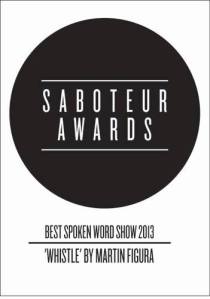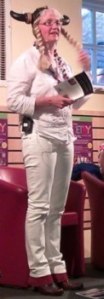Wow, what a day that was!
BEESTON POETRY DAY
We are just a tiny bit pleased with ourselves. Beeston Poetry Day, 29 September 2013, was fantastic. 22 poetry enthusiasts spent the day in Beeston Library in workshops about how to find inspiration, using form, where to send your poems once they’re ready for publication, how to perform/read your work to do it and yourself justice, one2one critiquing session.
We tickled our grey cells, stretched our pens and flexed our vocal cords. We also drank and ate lots to keep us going. (Tesco’s kindly donated some of the lunch, and there was cake in abundance baked by two members of the steering group. Nom, nom)
If you missed it, don’t be sad, we’re pretty confident we’ll be running a similar but different day next season. Watch this space, subscribe to this site, send us your email address, so as not to miss the next one.
A sample from ‘Whistle’
If you missed Martin Figura’s award-winning performance, here’s an excerpt.
and you can find out more about it on Martin’s own website.
It was a profound, moving and enjoyable event with a brilliant Q&A facilitated by Sheelagh Gallagher.
Jackie Kay reading ‘Fiere’
Just a quick reminder of our inaugural event last October…
Whistle is a winner for Martin Figura!
 We’re immensely pleased for Martin Figura, whose performance of Whistle has won the Saboteur 2013 Best Spoken Word Show Award. Among comments from the voters were the following:
We’re immensely pleased for Martin Figura, whose performance of Whistle has won the Saboteur 2013 Best Spoken Word Show Award. Among comments from the voters were the following:
- The most heartening true story of human resilience told in stunning poems I’ve ever seen in such an intense, understated show.
- Powerful, dark,moving, much said without the saying, great visuals and surprisingly fun also.
- Whistle transforms harrowing experiences into a moving and beautiful production.
- Shakespeare-like in its mixture of tragedy & humour
- Martin Figura’s poetry in “Whistle” is beautifully constructed and allows the reader a look into the events of Martin’s past whilst encouraging somewhat deeper reflection on one’s own circumstances, avoiding judgement and regret.
- An extraordinary story in poems and photos told with humour, subtlety and without self-pity. Invaded my dreams and will stay with me forever
- Whistle includes excellent poems and tells a compelling story. The multi-media elements add a great deal and the show has a wide reach. It’s been performed at many festivals and has everyone buzzing. Simply the best show I’ve ever seen.
Our own Cathy Grindrod was very strong in her insistence that we brought Whistle to Beeston, and here she tells us why:
Martin Figura’s riveting sequence of poems about his childhood, his father killing his mother, and the consequences of that upon the whole family is remarkable for the story he doesn’t tell, as much as for the story he does. (Jackie Kay)
I saw Martin Figura’s Whistle at Wenlock Poetry Festival and subsequently bought the book. The poems work superbly both on and off the page, which makes Whistle an excellent example of how writing can successfully cross the boundaries between page poetry, spoken word and theatre and end up in a class of its own.
Being a believer in the power of poetry to deliver life-changing messages, I was intrigued to know how such brave and dark subject matter as a murder within a poet’s own family might be approached and explored. The impact of the performance has remained with me. Moving, sometimes heartbreaking, yes; but it is above all a fascinating and entertaining coming-of-age story – sensitive, thoughtful, unsentimental, and with many moments of wit, warmth and humour.
Martin Figura has a wonderful stage presence. The addition of lighting and on-screen images to the performance create a masterful and professional whole.
Since my first experience of the performance, which has now been seen, appreciated and discussed by many, Whistle has been deservedly nominated for both the Saboteur Best Spoken Word show 2013 and the Ted Hughes Award for New Work in Poetry.
Cathy Grindrod
Ophelia’s Sistas – some poems
Here’s a little something to whet your appetite for Friday’s performance…
Ridge Walking
Char March
This
is my life
out here
on this edge.
Windy here
—a narrow ridge.
Often I am scared,
have to squeeze my eyes shut,
hug myself to the rock,
crawl along on all fours
mumbling mantras.
But sometimes
I dance the thin line,
whirling in the sun,
shouting in an arms-up,
head-back laugh.
This
Is my life out here.
A slim chance
with steep drops on either side,
but the views
Are bloody marvellous.
Wonderbra!
Valerie Laws
After he dumped me,
I felt a little flat. My life
Needed perking up,
So in search of something
Uplifting I turned to
Wonderbra!
I let Wonderbra handle everything,
Relaxed into its cupped hands,
Let it brace me up while
It carried my troubles for me.
It was fantastic. Suddenly
I was transformed, I had
Direction, Wonderbra pointed
The way. With its firm support,
I began to venture out. I followed
As Wonderbra led the way
Into every party. The trouble was,
I sometimes felt Wonderbra
Collected all the admiring glances,
The accidental arm-brushings,
While I stood behind. I felt
Unworthy to be with Wonderbra.
Then one night, a man
Sought me out, chatted, invited,
Seduced me back to his place.
Deftly, he removed my Wonderbra;
Left me drooping, and vanished
With it into the bedroom,
My false, deceiving Wonderbra:
I’m glad I’ve got it off my chest.
And… some animated poetry of pathology from Valerie Laws:
Watch this fullscreen at 1080pHD to get the full effect.
Andy Croft explains Pushkin sonnets
Did you miss Andy Croft’s reading last December? If you did, you probably won’t know what Pushkin sonnets are… watch this video clip to find out more and to hear the beginning of his latest novel written entirely in Pushkin sonnets, 1948.
Why you should see Ophelia’s Sistas
Last summer Valerie Laws and Char March came to Southwell Poetry Festival. They attracted an audience of around 40 people, but the laughter and applause that resounded around Southwell Library sounded as if it had come from at least twice that many people. I’ve talked to people who remember Val as ‘the woman with the horse skull’ and Char as ‘the woman who looks great in a Viking helmet’… all of whom are eager to see the show once more.
One of their fans is Sheelagh Gallagher, who has provided this review of their 2012 show.
The highlight of last year’s Southwell Library’s Poetry Festival for me was Ophelia’s Sistas, a performance by Valerie Laws and Char March.
An amazing experience, not at all like the mixed experience you get when you first hear your favourite poets reading live and are sometimes just a little bit disappointed and secretly want to tell them they’re not doing it right. (Or is that just me?)I had heard about Valerie Laws and her Quantum Sheep Haikus and I knew about Char March as part of the successful Some Mothers tour: I had no idea how they would connect their work to each other’s or to the hapless Ophelia. There’s a clue in the titles of their most recent collections which both come from Hamlet – Valerie Laws’ All that Lives and Char March’s The Thousand Natural Shocks, but there’s nothing forced about the way they bring their work together.
Both poets are experienced teachers and holders of residencies around the country and reflect the voices of the people they’ve worked with as well as exploring the humour and sadness in their own lives. Together they shocked and delighted their audience, Char with her responses to clunky stereotypes of lesbian life and Val with her adventures on becoming newly single. Very different perspectives, but so in tune with each other as they read and chatted that the audience was riveted.At the end of the performance and after enthusiastic applause there was a moment’s silence and people processed some of what they had heard. I saw people with tears in their eyes, some from laughing at Char’s outrageousness and some deeply moved by Valerie’s graphic images of malformed foetuses in pathology museums. After a short break they settled down to talk to the audience until the post–performance session looked likely to be longer than the reading. That’s something you don’t often see, an audience unwilling to leave the charged atmosphere of a great evening’s poetry.
Not for the faint-hearted, you might say. Well, yes, that’s the point of their rallying cry against Ophelia’s passivity. That and a challenge to poetry that is safe and cerebral. This poetry is tough and visceral and an unforgettable experience. I can’t tell you how pleased I am that they’ve agreed to come back to Nottinghamshire to our ever more popular Beeston Poets series. Don’t miss it!
Get your tickets (£7.50, £5.50 concessions) from Beeston Library or via our online shop. If there are tickets remaining, they will also be available on the door.
Ophelia’s Sistas and Whistle – tickets now available
Please visit our Big Cartel shop to buy tickets online for Ophelia’s Sistas on May 24th, and Whistle on July 5th. Both promise to be highly entertaining and jam-packed with superb poetry.
Versions of the North was wonderful… I’ll post a review soon.







